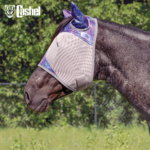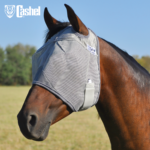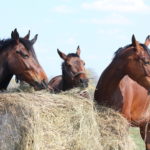Internet horse groups were buzzing in May after an e-mail was circulated claiming there were two extensive recalls of Purina feeds, coming on the heels of at least one other. Good thing, too. This ”rumor” was easily verified as fact, and the story appears to be a nightmare (see page 24).
For the last six months, Purina had a voluntary recall (they called it a ”retrieval”) of many feeds because of higher-than-permitted levels of aflatoxins. Aflatoxins are mold toxins, with a permissible feed level 250 times lower than for fumonisin, which is the moldy corn fungal toxin that claims equine lives every year.
Purina and state agricultural inspection officials in North Carolina first detected the problem in February, followed by Maryland catching it in feed from a second plant. Sounds like a system working well, but no apparent effort was made to notify horse owners of a possible problem.
Despite six months of potentially risky feed being on the market, we could find nothing on Purina’s website until May 3. As of May 6, we still could find no notice on the FDA website, the American Association of Equine Practitioners’ website or any of the involved states’ websites.
”Voluntary recall” sounds responsible, but any equine feed recall would be ”voluntary” because the FDA doesn’t have the authority to pull most foods, drugs or supplements from store shelves. It has to ”request” recall or go to court for a court order.
Purina says ”no confirmed aflatoxin-related health problems” have been reported. However, for a problem to be reported, it must first be found. To be found, somebody has to be looking for it. The first recall went out February 14 but pertained to feeds dating as far back as November 2007. Without knowing there is a potential problem with the name brand commercial feed, a plant of some type likely would be suspected as the culprit.
High doses of aflatoxin cause death related to massive liver failure. Few horses that die are actually necropsied, so the microscopic characteristic liver changes would not be found. More insidious effects with low exposures would likely be blamed on parasitism.
We asked the FDA why this problem wasn’t made public. They declined to comment beyond that the FDA was working with Purina on a ”health risk assessment.” But how can horses be assessed if no one knows to suspect the feed and aflatoxins as a cause of symptoms’
The FDA has documents detailing step-by-step how recalls should be handled. At the top of the list is promptly issuing a press release. Posting a notice on a website is inadequate. The recall letters Purina sent to its distributors were similar to those suggested by the FDA, but there is no information available on the amount of feed sold or recovered. As we go to press, we are talking with Purina and will bring you more details as they become available.






